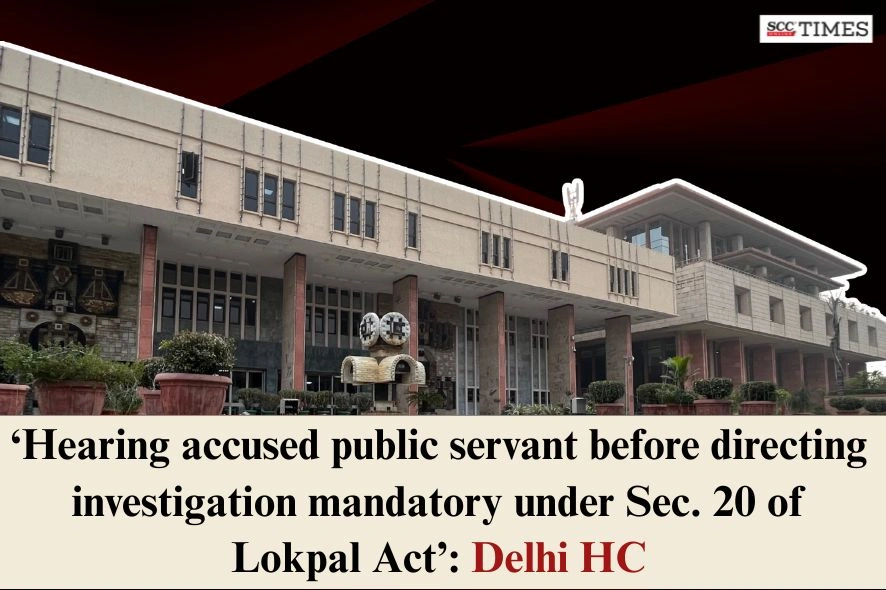Delhi High Court: Explaining the scope of the procedural safeguards under the Lokpal and Lokayuktas Act, 2013 (the Act), the Division Bench of Anil Kshetarpal, J and Harish Vaidyanathan Shankar, J*, held that requirement of considering the explanation of the accused public servant under Section 20(3) of the Act is mandatory in nature and leaves no scope for discretion.
Accordingly, the Court allowed the instant writ petition and quashed the impugned orders.
Background
In 2023, the petitioner had participated in the exam for the post of Chief Loco Inspector in the West Central Railway and had been declared successful. In 2024, a complaint had been lodged before the Lokpal alleging tampering of OMR sheets of the exam in exchange for bribe. On the basis of a preliminary inquiry report, the Lokpal issued show cause notices to five officers of the West Central Railway after which the Lokpal passed the first impugned order.
Vide order dated 21-2-2015 (‘first impugned order’), the Lokpal had concluded that the OMR sheets in possession with the Evaluating officer had been tampered with. Therefore, the Lokpal invoked Section 20(3)(a) of the Act and directed the Central Bureau of Investigation (‘CBI’) to carry out a detailed investigation.
On the basis of the investigation report submitted by CBI, the lokpal passed the order dated 23-9-2025 (‘second impugned order’) seeking the petitioner’s comments on the investigation report within two weeks.
By the instant petition, the petitioner approached the Court and contended that he had not been named as an officer of the west Central Railway (‘RPS officer’) under Section 20(3) of the Act prior to the initiation of investigation or registration of FIR and, therefore, the impugned orders and subsequent proceedings were contrary to principles of natural justice and void.
The question for adjudication before the Court was, whether adherence to the procedural safeguards enshrined under Section 20(3) of the Act was a mandatory provision where, pursuant to an inquiry or investigation, a person who was not originally named or arrayed in the complaint is subsequently found to be connected with the alleged acts.
Analysis, Law and Decision
The Court noted that even though the petitioner had been named in the complaint before the lokpal, no notice had been issued to him prior to the passing of the first impugned order. The Court also noted that unlike the other RPSs arraigned, the petitioner had not been afforded any opportunity to either file a response or to be heard at the stage of consideration under Section 20(3) of the Act.
The Court stated that the statutory framework of Section 20 categorically provides that the requirement of providing an opportunity of hearing at the pre-investigation stage as well as at the post-investigation stage is mandatory. Section 20(3) clearly provides that the lokpal ‘shall’, after giving an opportunity of being heard to the concerned public servant, decide whether a prima facie case exists and thereafter proceed to direct an investigation.
The Court further observed that even at the stage of preliminary inquiry under Section 20(1)(a), proviso three mandates that the lokpal ‘shall’ call for an explanation from the public servant so as to determine whether a prima facie case for investigation exists. A similar mandate is also contained under Section 20(7) which operates in the post-investigation stage.
Thus, the Court held that the mandate under Section 20(3) if the Act is peremptory and leaves no room for discretion. The legislative intent behind this is that the prima facie satisfaction necessary for directing an investigation under the Act must be reached only after considering the explanation offered by the public servant. Omission of this step, especially when it results in the registration of an FIR and the initiation of a criminal investigation, constitutes a violation of the statutory mandate and of the principles of natural justice.
The Court further opined that contrary to the respondent’s contention, when the statutory opportunity of hearing under Section 20(3) has already been denied, subsequent participation at the post-investigation stage under Section 20(7) of the Act cannot retrospectively validate the order that has been passed.
Accordingly, the Court allowed the instant writ petition and quashed the impugned orders for want of non-compliance with the mandatory requirement of Section 20(3) of the Act.
[Mujahat Ali Khan v. Lokpal of India, 2025 SCC OnLine Del 8481, decided on 14-11-2025]
Judgement Authored by: Justice Harish Vaidyanathan Shankar
Advocates who appeared in this case:
For the Petitioner: Hitesh Kumar, Nishant Singh, Vishal Yadav, Advocates
For the Respondent: Nishant Katneshwar, Vijay Singh, Advocates


